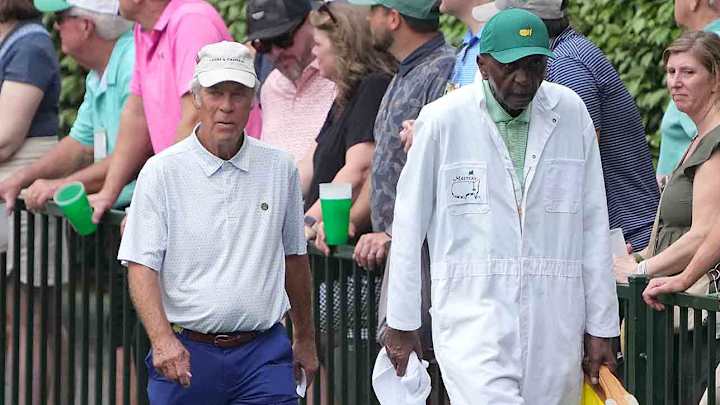When Rain at the Masters Did More Than Stop Play, It Ended an Era

AUGUSTA, Ga. — In the 1982 Masters, Craig Stadler beat Dan Pohl on the first hole of a sudden-death playoff for his only major championship. The first two rounds were plagued by heavy rains and cold temperatures, which led to a record 10-over-par cut. When play was suspended during Thursday’s first round at 5:30 p.m., most of the caddies filled the bag room with their player’s clubs. The bags that didn’t fit in the storage piled up outside in the rain.
When most of the players arrived the next morning to resume their rounds they found wet bags and no caddies. David Graham sent his wife, Maureen, out to shag his balls. Tom Watson considered using a pull cart. For Carl Jackson, who was Ben Crenshaw’s caddie, it was a jarring sight to see white men shagging golf balls. That just wasn’t done at Augusta National, where all the caddies had been Black since the club opened in 1932.
Most of the caddies hadn’t received the news that the tournament had changed the tee times. In 1982, the caddie master couldn’t send a text out to all 76 caddies. Eventually, word got around town to the caddies to get to the club, but the situation was all the ammunition that Watson needed to prove that it was time for the Masters to allow players to bring their regular caddies off the PGA Tour. The two-time Masters champion, who won both his green jackets with a Black Augusta National caddie, wrote a letter to club Chairman Hord Hardin asking for a change to the rule. Later that year, Hardin lifted the ban against non-Augusta National caddies working at the Masters. “Augusta National should never take the position which to players or the golf public would appear to be unfair,” Hardin said in a statement that November.
At the 1983 Masters only about a dozen players stuck with their Augusta National caddies. Robert “Cigarette” Jones, a saxophonist and longtime Augusta National caddie, was one of those that retained a bag. Arnold Palmer said that the weather conditions in ‘83 were as bad as he had ever seen them in all of his years coming to the tournament. That year Seve Ballesteros won his second green jacket in the tournament’s last Monday finish.
Jones remembers the tournament for the 87 that Calvin Peete shot in the third round. Peete was in contention after rounds of 70 and 72 until the cold temperatures and winds sent his game spiraling out of control. After the round, Peete was asked what he thought of the traditions at the Masters.
“Until Lee Elder, the only Blacks at the Masters were caddies or waiters,” he said. “To ask a Black man what he feels about the traditions of the Masters is like asking him how he feels about his forefathers who were slaves.”
Now in his early 80s, Jones gets dialysis three days a week and plays cards at the Patch, a municipal course in Augusta that attracts many of those old caddies who lost their jobs at the Masters. On Saturday as rain poured at the Augusta National, he reflected on the weather at the course and in the tournament and its impact on the fortunes of Black caddies. A tough-as-nails guy who once worked for a demanding Augusta bandleader named James Brown, Jones brings the perspective of someone who is both a veteran of the Masters and the PGA Tour. He never had a winning bag at the Masters, but he did have second-place finishes with Don January and Gene Littler. On the PGA Tour, he had a win with Bobby Cole at the ’77 Buick Open and another one with Jeff Mitchell at the ’80 Phoenix Open.
“This is the hardest weather for a caddie to work in,” he told me. “It’s a tough walk any time you walk Augusta National, but particularly when it’s raining and cold.”
For Jones, most of the responsibility for what happened at the ’82 Masters falls on the caddies. “Any time it rains you’re supposed to keep the bags and the clubs dry,” he said. “It’s up to you to protect your own job. As a caddie it’s your responsibility to be on time, have good personal hygiene and speak when spoken to.”
According to Jones, there were many excellent caddies that he worked with at the club, but there were also some who were unprofessional. I suppose that’s true with any job, but the move away from Augusta National caddies at the Masters was inevitable.
“It was going to happen but the rain incident in ’82 just expedited the change,” said Ward Clayton, the author of Men on The Bag: The Caddies of Augusta National.
Jones said that he wasn’t upset when Augusta National lifted the ban on non-club caddies. “I saw it coming,” he said. “I tried to warn the guys. The attitude toward caddies was changing at clubs. I could see it out on the PGA Tour.”
On Saturday afternoon, he looked back to those times with no regrets as the horn blew to suspend Saturday’s third round for the day. He wished he could be there on the grounds at Augusta National. Nowadays, most of the players take their bags with them when they leave the course. Cell phones and other technology have made communication between players and caddies seamless. All of those advances don’t mean much to Jones. “I was prepared for anything for my player,” he said. “I was a good caddie in any kind of conditions.”

A former golf writer at Sports Illustrated and ESPN.COM, Evans has written extensively about race in America for publications such as SI, Golf Magazine, GQ, Esquire, Inc. Magazine, ESPN.COM, Andscape, Bleacher Report, History.Com, and Bloomberg.